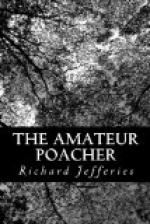The pleasure of wandering in a wood was so great that it could never be resisted, and did not solely arise from the instinct of shooting. Many expeditions were made without a gun, or any implement of destruction, simply to enjoy the trees and thickets. There was one large wood very carefully preserved, and so situate in an open country as not to be easily entered. But a little observation showed that the keeper had a ‘habit.’ He used to come out across the wheatfields to a small wayside ‘public,’ and his route passed by a lonely barn and rickyard. One warm summer day I saw him come as usual to the ‘public,’ and while he was there quietly slipped as far as the barn and hid in it.
In July such a rickyard is very hot; heat radiates from every straw. The ground itself is dry and hard, each crevice choked with particles of white chaff; so that even the couch can hardly grow except close under the low hedge where the pink flower of the pimpernel opens to the sky. White stone staddles—short conical pillars with broad capitals—stand awaiting the load of sheaves that will shortly press on them. Every now and then a rustling in the heaps of straw indicates the presence of mice. From straw and stone and bare earth heat seems to rise up. The glare of the sunlight pours from above. The black pitched wooden walls of the barn and sheds prevent the circulation of air. There are no trees for shadow—nothing but a few elder bushes, which are crowded at intervals of a few minutes with sparrows rushing with a whirr of wings up from the standing corn.
But the high pitched roof of the barn and of the lesser sheds has a beauty of its own—the minute vegetation that has covered the tiles having changed the original dull red to an orange hue. From ridge to eaves, from end to end, it is a wide expanse of colour, only varying so much in shade as to save it from monotony. It stands out glowing, distinct against the deep blue of the sky. The ‘cheep’ of fledgeling sparrows comes from the crevices above; but swallows do not frequent solitary buildings so much as those by dwelling-houses, being especially fond of cattle-sheds where cows are milked.
The proximity of animals apparently attracts them: perhaps in the more exposed places there may be dangers from birds of prey. As for the sparrows, they are innumerable. Some are marked with white patches—a few so much so as to make quite a show when they fly. One handsome cock bird has a white ring half round his neck, and his wings are a beautiful partridge-brown. He looks larger than the common sort; and there are several more here that likewise appear to exceed in size, and to have the same peculiar brown.
After a while there came the sound of footsteps and a low but cheerful whistle. The keeper having slaked a thirst very natural on such a sultry day returned, and re-entered the wood. I had decided that it would be the best plan to follow in his rear, because then there would be little chance of crossing his course haphazard, and the dogs would not sniff any strange footsteps, since the footsteps would not be there till they had gone by. To hide from the eyes of a man is comparatively easy; but a dog will detect an unwonted presence in the thickest bush, and run in and set up a yelping, especially if it is a puppy.




